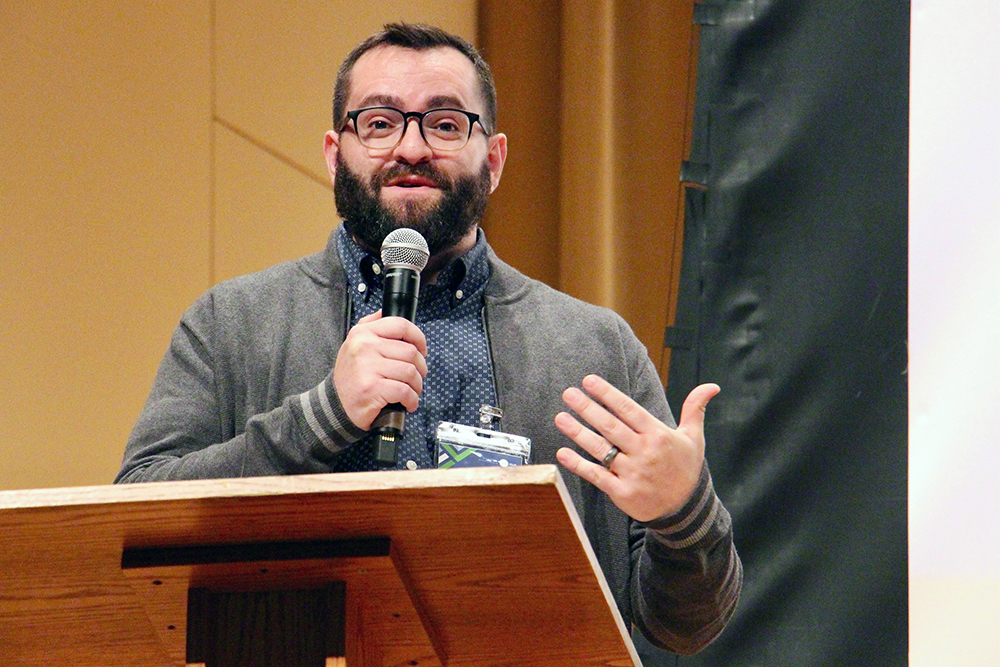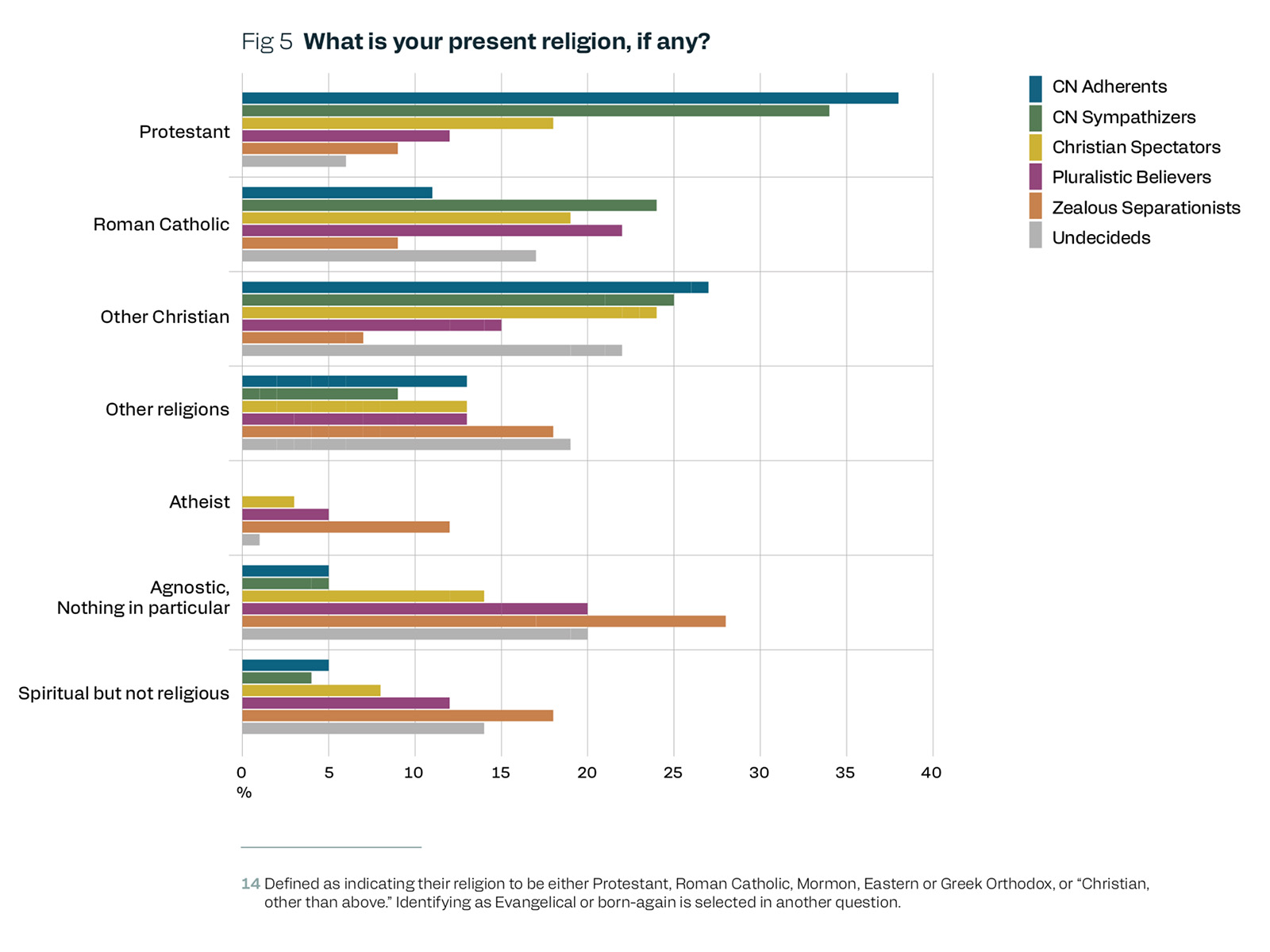(RNS) — A brand new research estimates that about 30% of Individuals are open to the concepts related to Christian nationalism, however the research’s authors say those that adhere to or sympathize with the ideology are a extra advanced group than media portrayals and even different research have discovered.
“Christian Nationalism: A New Approach” is the work of Neighborly Religion, a company based to assist evangelical Christians construct stronger relationships with folks from different spiritual teams. In a webinar on Monday (Dec. 18), Neighborly Religion researchers mentioned they took a extra detailed have a look at Christian nationalism than earlier efforts, starting with the criterion sometimes used to establish Christian nationalist leanings. The place most surveys ask six questions, the Neighborly Religion survey requested 14.
The six-question rubric, Neighborly Religion Director Chris Stackaruk mentioned, makes it “very tough to distinguish what’s Christian nationalism versus what’s socially or theologically conservative Christianity.”
Along with the unique six questions, Neighborly Religion requested respondents whether or not they believed America has a “particular God-ordained objective,” whether or not U.S. tradition is “essentially Christian” and whether or not “Christian values” needs to be “solely and explicitly endorsed by the federal government.”
Neighborly Religion cut up respondents into six classes: Christian nationalist “Adherents” (11%) and “Sympathizers” (19%); Christian “Spectators” (18%) who sympathize with “conventional Christian views” however are much less prone to have interaction politically; “Pluralistic Believers” (19%) who’re extra spiritual than the common American however oppose authorities endorsement of Christianity; “Zealous Separationists” (17%) who “strongly oppose” commingling of church and state; and “Undecideds” (16%).
The researchers acknowledged that a few of their knowledge carefully matches a 2023 PRRI/Brookings survey that estimated that 10% of Individuals are Christian nationalist adherents and 19% are sympathizers. However Neighborly Religion’s methodology, its researchers mentioned, allowed for a extra nuanced have a look at Christian nationalism utilizing a definition calling it “a motion advancing a imaginative and prescient of America’s previous, current, and future that excludes folks of non-Christian religions and non-Western cultures.”
Kevin Singer, Neighborly Religion’s president, mentioned its research confirmed that Christian nationalists usually “romanticize Christianity’s affect on America’s improvement” and imagine the U.S. advantages from “God’s particular favor.”

Kevin Singer addresses the Neighborly Religion Convention on Nov. 1, 2019, on the Billy Graham Middle for Evangelism at Wheaton School. (RNS photograph/Emily McFarlan Miller)
Different definitions of Christian nationalism take a tougher line. Samuel Perry and Andrew Whitehead, authors of “Taking America Back for God: Christian Nationalism in the USA,” defines Christian nationalism as “a cultural framework that blurs distinctions between Christian id and American id, viewing the 2 as carefully associated and looking for to boost and protect their union.” Amanda Tyler, of the Baptist Joint Committee for Spiritual Liberty, has charged that it “carries with it assumptions about nativism, white supremacy, authoritarianism, patriarchy, and militarism.”
However Singer famous that the Neighborly Religion research revealed adherents of Christian nationalism present stunning ranges of assist for some pluralistic beliefs. Whereas adherents have been much less possible general to assist the concept that the U.S. ought to absorb refugees “even when I don’t share the identical beliefs as them,” as an example, greater than half (51%) nonetheless supported welcoming refugees at some degree.
What’s extra, Christian nationalist adherents and sympathizers have been roughly as possible as some other group (round 50-55%) to say they’re reasonably or very prone to take part in or attend occasions encouraging interfaith dialogue or understanding.
In a digital panel dialogue in regards to the research, Kaitlyn Schiess, writer of the forthcoming e-book “The Poll and the Bible: How Scripture Has Been Used and Abused in American Politics and The place We Go from Right here,” framed these findings as a hopeful signal for critics of Christian nationalism. They level to “actual inroads,” she mentioned, for pastors and others involved in regards to the ideology to faucet right into a shared “want to work throughout strains of non secular perception for the widespread good.”
Even so, Singer was fast to notice that worrying traits are disproportionately current amongst Christian nationalist sentiments and adherents. “Our research is, certainly not, saying that Christian nationalism is a preferable worldview to have or to endorse,” mentioned Singer.
Christian nationalist adherents, researchers discovered, have been the most definitely to precise the very best choice for a “robust chief who doesn’t must cope with Congress and elections” (37%), and greater than half mentioned the opposing get together “lack(s) the traits to be thought-about absolutely human — they behave like animals.” In keeping with the research, adherents and sympathizers additionally “exhibit an inclination to dislike many outgroups, and like their authorities to favor Christianity over different faiths,” with adherents specifically favoring the thought of getting Christian clergy evaluate and advise on legal guidelines (59%) and having “America’s Judeo-Christian founding explicitly established within the Structure” (49%).

“What’s your current faith, if any?” (Graphic courtesy
Neighborly Religion)
The research additionally affords an unusually detailed profile of Christian nationalists. Adherents are 70% non-Hispanic white, as an example, and have the most important focus of evangelical Christians (71%). Amongst those that sympathize with Christian nationalist concepts, 60% say they’re evangelicals, and adherents have been additionally extra prone to be married than others within the survey, by 62% to 49%.
Nonreligious people — those that mentioned they have been atheists, agnostics, nothing specifically, religious however not spiritual or “one thing else” — have been one of the best represented among the many Zealous Separationists — those that oppose fusions of church and state — comprising 65% of that group. Separationists additionally exhibited comparatively excessive ranges of political participation, whether or not in protests or voter registration drives.
Christian nationalist adherents and sympathizers, nevertheless, have been just a few factors behind separationists in political participation and collectively outnumber them (adherents and sympathizers collectively characterize 30% of the inhabitants nationally, whereas separationists characterize 17%). Roughly half of adherents additionally reported having shifted their shopping for habits attributable to a social or political problem, the very best of any group.
Christian nationalist adherents and sympathizers have been additionally the most definitely to say they voted for former President Donald Trump in 2020 and in addition extra prone to have voted in any respect (67% and 68%, respectively) in comparison with different teams. Separationists voted at 64%, nevertheless, and confirmed the very best assist for any particular candidate (61% mentioned they voted for President Joe Biden).
As for get together affiliation, round 17% of the Republicans or those that lean Republican have been labeled as Christian nationalist adherents, with a further 30% marked as sympathizers and 21% Christian Spectators. On the Democratic facet, 30% have been Zealous Separationists, 25% Pluralistic Believers and 15% have been Christian Spectators.
Neighborly Religion partnered with Technites for the survey, which was carried out between June 16 and June 21, 2023. It polled 2,006 U.S. adults and an oversample of 303 evangelical youth ages 18 to 25 for a complete of two,309 respondents.








